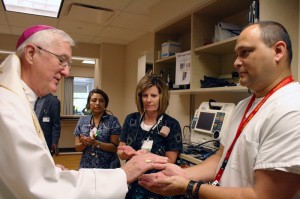By Barb Arland-Fye
The Catholic Messenger
CLINTON — Bishop Martin Amos walked through Mercy Medical Center-Clinton’s south and north campuses, breaking stride to bless the hands of health care workers at nursing stations, in offices, hallways and cafeteria. Blessing of the hands is a tradition at the Catholic, nonprofit health system, but this year’s ritual coincided with commemoration of 125 years of hospital care in the Clinton region. After blessing all those hands Sept. 26, Bishop Amos presided at a Heritage Celebration Mass beneath a canopy outside the north campus.

Bishop Martin Amos blesses the hands of, from left, Maria Schroeder, Kathy Goetzl and Jerry Skimhorn, all RNs on the Medical/Surgical Unit of Mercy Medical Center-Clinton.
Even though much has changed in 125 years, most significantly the merging of two hospitals — one founded by Presbyterians and the other by Catholics — the mission has not changed. Bishop Amos described that mission in his homily: “to work together and with others to continue the healing ministry of the Church, promoting the well-being of people in the communities we serve by living the values of compassion, respect, concern for those who are poor, excellence and stewardship.”
Sean Williams, Mercy’s president and CEO, said at a reception after Mass that the health system’s mission is to serve people who need care, and to ensure that they leave better than when they arrived. “We love people, but we love them enough to not leave them where they are, but to call them to a higher level.”
Julie Dunn, the health system’s director of marketing and public relations, noted that Mercy’s history is rich and complex. “It is a tale of two hospitals that continually faced challenges as medical science evolved and yet, the years are bound together by the common thread of compassionate care provided by the nurses and those who served at either hospital.”
A Presbyterian women’s group founded Agatha Hospital, one of the first in Clinton, which cared for its first patient on Sept. 1, 1889. Also that year, Father James Murray came to Clinton and inspired Catholic residents to start St. Joseph Mercy Hospital.
In 1989, St. Joseph Mercy Hospital combined with Jane Lamb Hospital (the former Agatha Hospital) to become Samaritan Health System. The health system established a new mission, vision and corporate identity in 1999, becoming Mercy Medical Center-Clinton.
Today Mercy is one of the largest employers in the Clinton area with more than 900 employees. The health system partners with 160 physicians to provide more than 30 specialty services and, in fiscal 2013, provided more than $3.2 million in community benefits and charity care.
“We recognize that individuals will go to a physician and a medical facility that they feel will provide the very best care,” Williams said. “At Mercy, our focused attention to ensure the highest quality of care in the safest environment, as indicated by measurable outcomes, demonstrates our commitment and dedication to our community. We feel that when we can demonstrate through these outcomes, that we provide quality care, we assure our community that they are getting the very best medical care available.”
Williams also noted that Mercy Medical Center-Clinton was the first hospital in Iowa to incorporate tele-medicine, “not only on our behavioral health unit, but also for the care of stroke patients. The ability to tap into the emerging trend of tele-medicine gives patients in our area the benefit of having world-class physicians available through the use of a two-way monitor.”
Asked how the Affordable Care Act impacted the care Mercy provides, Williams said: “For years, we have advocated to find a way to insure those who were uninsured and make access to health care more affordable for all. We have taken what we refer to as a no regrets strategy, which points to the fact that high quality care delivered in the most efficient manner will be successful no matter what the regulatory or payment environment. We are also working toward initiatives to guide population health through the use of health coaches and are working closer with physicians to ensure a continuum of care.”
The changing landscape of healthcare requires great vision, noted Mercy Board Chairman Bruce Christensen. “All of you should take pride in knowing you make a difference,” he told the gathered employees at the celebration honoring a heritage of hearts and hands that serve.








